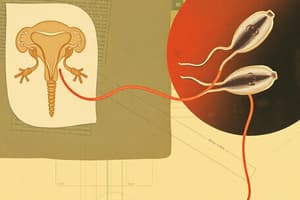Podcast
Questions and Answers
What is the initial outcome of the fertilization process?
What is the initial outcome of the fertilization process?
- Initiation of embryonic development
- Formation of the morula
- Completion of cell cleavage
- Formation of the zygote (correct)
What occurs immediately after fertilization?
What occurs immediately after fertilization?
- The implantation of the zygote
- The transformation into a blastocyst
- The fusion of the sperm and egg (correct)
- The first cleavage division
Which of the following processes follows fertilization?
Which of the following processes follows fertilization?
- Cleavage (correct)
- Spermatogenesis
- Gametogenesis
- Ovulation
What is a critical role of the blastocyst in embryonic development?
What is a critical role of the blastocyst in embryonic development?
What characterizes the process of cleavage following fertilization?
What characterizes the process of cleavage following fertilization?
Which statement correctly describes fertilization?
Which statement correctly describes fertilization?
What is the consequence of successful fertilization?
What is the consequence of successful fertilization?
What stage directly involves the arrangement of cells into a blastocyst?
What stage directly involves the arrangement of cells into a blastocyst?
Flashcards
Fertilization
Fertilization
The union of sperm and egg, forming a zygote
Zygote
Zygote
The fertilized egg resulting from fertilization
Cleavage
Cleavage
Rapid cell divisions after fertilization
Blastocyst
Blastocyst
Signup and view all the flashcards
Sperm Transport
Sperm Transport
Signup and view all the flashcards
Implantation
Implantation
Signup and view all the flashcards
Egg (Ovum)
Egg (Ovum)
Signup and view all the flashcards
Sperm
Sperm
Signup and view all the flashcards
Study Notes
Fertilization
- Fertilization is the merging of a sperm cell from a male and an ovum (egg) from a female, creating a zygote.
- This process is essential for sexual reproduction and initiates embryonic development.
Sperm Transport
- Sperm are deposited in the female reproductive tract after ejaculation.
- They travel through the cervix, uterus, and fallopian tubes.
- Capacitation is a crucial process for sperm, enabling them to fertilize an egg.
- It involves biochemical changes in the sperm's plasma membrane.
Interaction with the Egg
- The egg is surrounded by layers: the corona radiata (granulosa cells) and the zona pellucida (glycoprotein layer).
- Sperm must penetrate these layers to reach the egg's plasma membrane.
- Acrosome reaction: The acrosome releases enzymes that digest the zona pellucida, allowing sperm to reach the egg.
- Sperm binding: Sperm binds to specific receptors on the egg's surface after penetrating the zona pellucida.
Fusion of Sperm and Egg
- Membrane fusion: Upon binding, the plasma membranes of the sperm and egg fuse.
- This allows the sperm's nucleus to enter the egg.
- Cortical reaction: After sperm entry, the egg releases enzymes modifying the zona pellucida, preventing polyspermy (multiple sperm entering).
Formation of the Zygote
- After fusion, the sperm and egg nuclei combine.
- This results in a diploid zygote with a complete set of chromosomes.
- The zygote travels down the fallopian tube towards the uterus.
Cleavage
- Cleavage: Rapid mitotic divisions after fertilization forming a multicellular structure (blastula).
- Blastomeres are the smaller cells produced by these divisions.
- Cleavage stages: Two-cell, four-cell, eight-cell, and 16-cell (Morula).
- Radial Cleavage: Cells arranged symmetrically (typical in deuterostomes).
- Spiral Cleavage: Cells arranged at an angle (typical in protostomes).
Blastocyst Formation
- Fluid accumulation in the morula forms a blastocoel (cavity).
- The morula transforms into a blastocyst.
- Blastocyst components:
- Inner Cell Mass (ICM): Develops into the embryo.
- Trophoblast: Forms the placenta and aids in implantation.
Implantation
- The blastocyst reaches the uterus around 5-6 days post-fertilization.
- It implants in the uterine wall (endometrium).
- Trophoblast cells invade the endometrium.
- The blastocyst establishes connections for nutrient exchange.
Studying That Suits You
Use AI to generate personalized quizzes and flashcards to suit your learning preferences.



